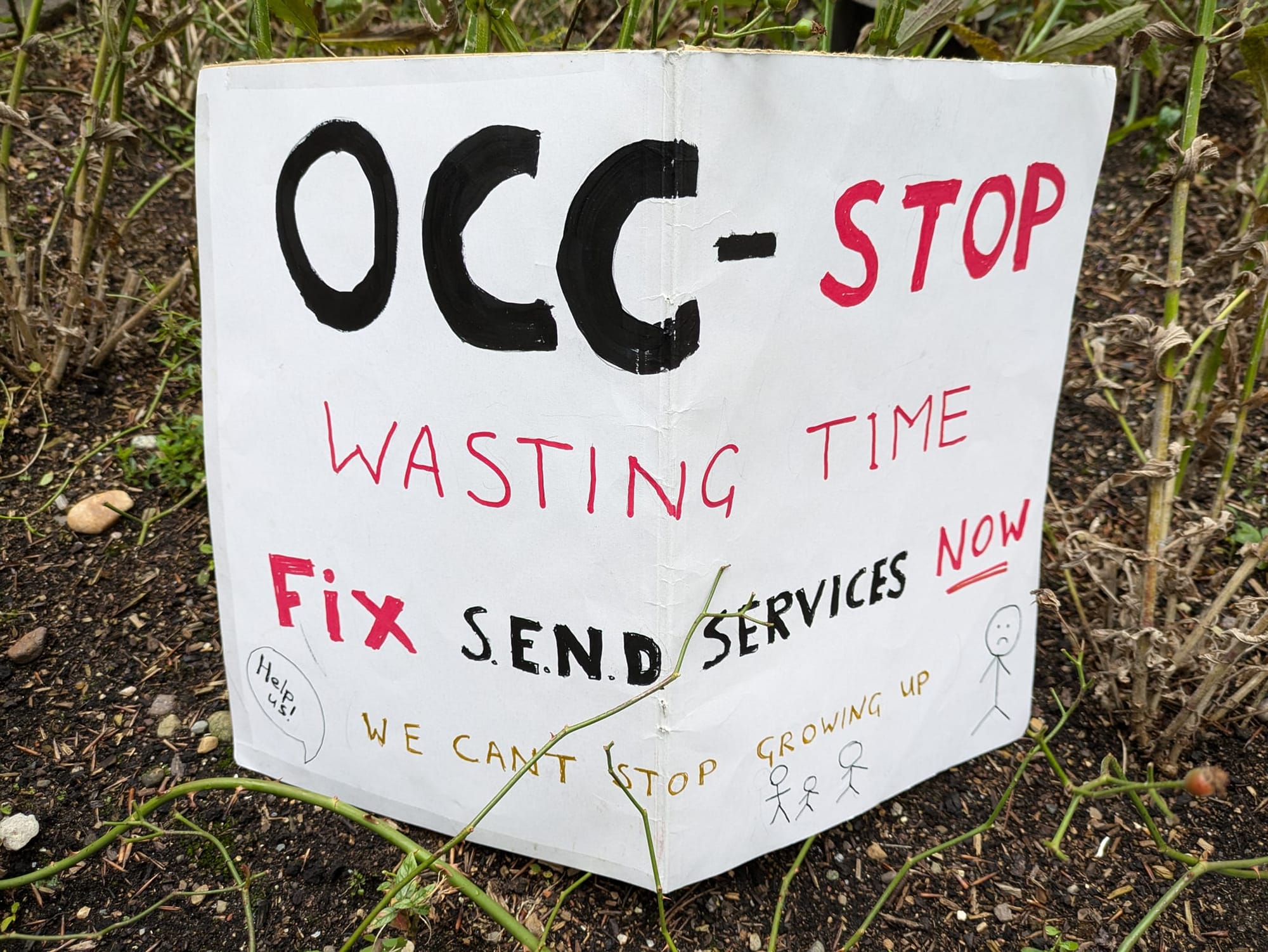Special Educational Needs: are the funding taps finally being turned on?

Oxfordshire’s on-going Special Educational Needs (SEND) crisis continues. The Government has pledged additional funding – but will it be enough?
Following the recent Budget, the Labour Government announced on December 4 a “£740m capital investment to create more specialist places in mainstream schools”. Education Secretary Bridget Phillipson promised “tangible change to the SEND system to improve experiences for children and families”. Writing to the teachers shortly after her appointment, Phillipson said:
A huge part of my role is to understand the scale of the challenges you are facing, and the support needed to fix them. The scar of child poverty, severe financial pressures squeezing all your budgets, high workload, climbing vacancy rates, strain on care, mental health and SEND services, among many other issues, have made your jobs increasingly difficult. This is a tough inheritance – none of these have quick and easy solutions but I will work with and for you to find practical ways forward.
The new funding will be used to adapt classrooms to be more accessible for those with SEND. It echoed promises at the Labour conference to “reform the system overall”.
New schools
After years of retrenchment, Oxfordshire is expanding its special school capacity. Earlier this year, 23 new places were approved for the existing Mabel Prichard Special School in Oxford, an ‘all-through school’ (ages 2-19) on Cuddesdon Way in Blackbird Leys.
Bloxham Grove Academy opened in January with 77 students, due to expand to 100. Situated just outside Banbury, it begins at age 7 – catering for children who may have started mainstream primary school but been given an EHCP early on (Education, Health & Care Plan) – and continues to 18.
A 104-place special school will open in Faringdon in 2026, for children with a diagnosis of autism or Social Emotional Mental Health needs. It will be built on the site of the former village primary. All three of these schools are run by the Gallery Trust, an academy chain with five other special schools in Oxfordshire.
Two more special schools are planned for Didcot, including another for children with autism or SEMH needs, expected to open in 2027-2028. Further into the future, the current LibDem/Green council says that it plans “two new 150 pupil place schools”, at a cost of £50m.
Provision in mainstream schools
New special schools can transform the lives of children who find a place there, whether eventually transferred out of mainstream education after the slow assessment process, or entering education for the first time. The new openings mean, compared to just a year ago, 220 children are getting an education more suited to their needs. As more special schools open, this figure will go up.
But Oxfordshire has thousands of children with special educational needs in mainstream education. For many, working within their existing school continues to be a more appropriate level of support. It is here that new national funding could make a difference.
Right now, day-to-day (revenue) spending is running ahead of the funding available – in Oxfordshire as in many other counties. Calum Miller, LibDem county councillor for Otmoor (and new MP for Bicester & Woodstock), raised this issue at Tuesday’s Oxfordshire County Council meeting. Finance cabinet member Dan Levy responded:
The Government has given out roughly £1bn in additional funding, but even that will not make us break even – it’s roughly half the money we need. The situation continues to get worse. The Government has already indicated that it will extend the override [an accounting measure allowing councils to run a deficit for SEND], which is good, but it still doesn’t solve the underlying problem.
Parents and carers
Oxfordshire’s poor record only hit the headlines in 2023 when Ofsted delivered a verdict of “widespread and systemic failings”, but it had been an open secret among teachers and parents for years. Since then there have been petitions and frequent representations at county council meetings. Our inbox sees correspondence from distraught parents and teachers, and we suspect we see only a fraction of the challenge. One parent wrote:
We exist in a world of uncertainty and confusion over the SEND system and support. We advocate for our son, but we know he's not happy. We’re terrified we're failing him because we literally don't know where to turn. And we know children with much higher needs. What must their parents be going through?
A Facebook group, ‘Oxfordshire SEND Parent Action’, updates parents on latest developments and co-ordinates representations to Council. Crucially, parents’ and carers’ complaints are not just about lack of investment, but also the processes that OCC employs, which they say can be remote and unfeeling.
One anonymous blog takes a mordant look at the progress reports being issued by the chair of the Oxfordshire SEND Strategic Improvement and Assurance Board (which brings together OCC, the NHS, and a parent/carer forum). The author is not always impressed, writing:
For diagnoses recorded between start of April 2022 and end of March 2024, mean waiting times were 527 days for ASD, and 570 days for ADHD. That year-and-a-half wait can be a large fraction of a child’s life and without the diagnosis, many paths to support are blocked.
(The full blog is worth a read, as well as reading it in tandem with the SEND Director's blog: they encapsulate both the intense frustration experienced by parents and children, and the immense complexity involved in delivering reform at pace to an underfunded area.)

In the council chamber
A council meeting in July was addressed by Katie Nellist, a young speaker who described herself as being “in the SEND system for six years”.
During the October emergency council meeting, you all agreed to work in a cross party manner to fix the issues on SEND… SEND should not be political, and motions like this are stopping you hearing other motions about important topics today… I just want you all to stop playing politics with our lives and futures. Please do better.
Her observation has the air of truth. The debate about SEND in Oxfordshire has become strongly party-political.
As one example, this week, Cllr Liz Brighouse (Churchill & Lye Valley), leader of the Labour group on Oxfordshire County Council, issued a statement welcoming the Government’s new funding for special education – while attacking both the LibDem/Green coalition at OCC and the previous Conservative government.
The SEND system our new Labour government inherited from the Tories has totally lost the confidence of families. This remains starkly apparent in Oxfordshire, where SEND parent-carers are still struggling as our LibDem/Green County Council coalition have failed to make meaningful improvements. Together with our new Labour government, Oxfordshire's Labour County Councillors will build a system where every child can achieve and thrive. Early intervention and supporting children in their mainstream community schools is key. We are absolutely committed to this. There is no magic wand or quick fix, but there is light at the end of the tunnel.
Councillor Brighouse previously held the Education portfolio (including SEND) under the ‘Fair Deal Alliance’ coalition between the Liberal Democrats, the Labour Party, and the Green Party. This coalition started after the 2021 election and lasted until September 2023, when the Labour Party left the coalition after an OFSTED report found the County Council to be failing in its delivery of SEND provision. Inspectors at the time said the service had “long-standing failings”, leading to “a tangible sense of helplessness” among families.
Following the Ofsted report, Liz Leffman (LibDem), as council leader, asked Liz Brighouse to move to another post. She refused, and Labour chose to quit the coalition entirely. Labour councillor Damian Haywood (Iffley Fields & St Marys), who has a son with special educational needs, resigned from the party in protest, saying its behaviour was “self serving and contrary to the needs of my constituents” and that it had failed to address concerns over SEND leadership.

This was the background to a Vote of No Confidence brought by the Labour group in July. The motion, proposed by Cllr Brighouse, began “This Council records its particular failure to […] keep members and parents abreast of improvements to its SEND provision following last year’s Ofsted–CQC determination.”
But Labour alone did not have the votes to carry the motion, and the Conservatives declined to back it. Conservative group leader Eddie Reeves (Banbury Calthorpe) called the motion “The right motion from the wrong political group at the worst possible time”, saying “I am not going to plunge this council into chaos for the sake of making a facile political point.”
Cllr Ian Corkin (Conservative, Ploughley) was blunter still, calling the motion a “colossal bout of navel gazing”, and adding that “Cllr Brighouse bringing this motion is like an arsonist complaining about the size of the blaze”. (Cllr Brighouse responded that “The stories that have been told in this chamber are slanderous.”)
2025
Kate Gregory (Lib Dem, Thame & Chinnor) is the Oxfordshire county councillor who, since September 2023, has held the cabinet post for SEND Improvement. She told the Clarion the situation was getting better:
Since 2023, we have committed an additional £1m to support SEND services. There will also be an additional 300 special places available by 2028. A new special school, Bloxham Grove Academy, opened in the north of the county in early 2024. We’ve refreshed our approach to assessments for education, health and care plans (EHCPs) so that we meet statutory deadlines, and I’m pleased that our performance is now above the national average: The national average for completing EHCPs within 20 weeks was 50.3% in 2023 (latest available figure). Oxfordshire County Council’s figure for May 2024 was 57.9%. This is up from 4% in January 2023.
Next spring will be pivotal. It is, of course, the run-up to the county council elections in May. Will any parties choose to fight on their SEN policies – or are we doomed to a “potholes and traffic” election?
But before that comes a crucial date in the council year: the budget. Because the LibDems and Greens do not have a majority, they are reliant on opposition votes (or, at least, abstentions) to pass the budget, and that often means agreeing to an amendment. Last year, Labour’s successful amendment saw more capital spent on potholes and “traffic congestion improvements”, but only revenue (day-to-day) funding for special education.
The two new 150-place schools promised by the LibDems and Greens are, as yet, unfunded. Could either Labour or the Conservatives seek to bring the £50m spend on these schools forward – or will Oxfordshire Labour decide its loyalties lie with a Government which is prioritising “supporting children in their mainstream schools” over new special school capacity?
Are we moving forward?
Should SEN be a party political issue?
Local politicians might argue that it’s through party politics that cheques are signed, that policies are rewritten, that change happens. Parents and carers could counter that a debate fought in headlines of “he said, she said” ignores the lived experience of the children, and their families, struggling to be heard. More seasoned observers might note a bureaucratic, unfeeling system that sails on regardless of what the politicians do.
Regular readers of the Clarion will know our mantra – is it real or is it for a leaflet? Part of us would like to see this on a leaflet. It is arguably a more urgent issue than potholes, LTNs and the endless accusations of “pet projects”. But there is only any point if the promises are then fulfilled – and if on May 2, the elected councillors are prepared to put aside their differences to work together. On current performance, we are not hopeful.
